Q&A: How will astronauts shower on the moon?
What happens when you put a space scientist interested in looking for alien life, a geologist studying some of the earliest life on Earth, a psychologist, and a linguist in a radio studio? Well hopefully a really interesting conversation and answers to some of science’s - and your - big questions, because that’s the line up for our Naked Scientists “ask us anything” QnA call-in this week: you supply the questions and we’ll provide the answers.
In this episode

Meet our panel
Will McMahon & Xander Byrne & Charlotte Kukowski & Stefanie Ullmann, University of Cambridge
Chris - With me this week is Will McMahon, who's a geologist at the University of Cambridge. He uses a variety of different geological techniques to study some of our most important periods in history since the planet was first formed about four and a half billion years ago. In your view then, Will, what is really the most important time in the earth's life?
Will - For me, it's got to be when plants were first colonising our continents. If we look around today, we have greenery everywhere. In fact, if you were to try and add up the biomass of all forms of life and put it on some big massive weighing scale, about 85% of the total would be made up by plant life.
Chris - So plants make up 85% of the mass of everything that's alive on earth?
Will - Everything - every kingdom of life, 85% of it.
Chris - And when did the first plants appear?
Will - So we're talking about 450 million years ago. It sounds like a long time, but bear in mind, earth is 4.5 billion years old. So 90% of earth's history, we actually had no plant life at all.
Chris - Thank you. Will also here, Xander Byrne, who's at the Institute of Astronomy. One of your interests is looking for exoplanets. That got a Nobel Prize, didn't it? These are planets that are not in our own solar system. They're planets orbiting stars elsewhere out there in space. How on earth do we find them?
Xander - That's all correct. So the problem with this is that planets don't usually emit very much of their own light. They're usually blinded by the light of the star that they're in orbit around. So we usually have to find them by the way that the star light is affected by the planet, whether that's the planet passing in front of the star and blocking out some of the starlight, or whether it's due to the planet's gravitational effect on the star causing it to wobble about and altering the kind of colours that we can see in the star's spectrum.
Chris - How likely do we think out there is another earth?
Xander - This is quite a difficult question to answer, but it's a bit of a numbers game, right? I mean, we think that pretty much every star that's out there has at least one or two planets around it. And in our own galaxy alone, there are 200 billion stars, something like that. And there are tens of billions of galaxies in the observable universe. So when you multiply these numbers up, it seems pretty inevitable that there would be something very, very analogous to earth out there somewhere.
Chris - Also with us this week, Charlotte Kukowski is a psychologist and she's at the University of Cambridge's Social Decision Making Lab, and she's also on the panel for a talk, which is happening at the Cambridge Festival, and that incidentally kicks off on March the 17th. And her talk is titled, "What Is For Dinner: The Future of Meat." So what are you going to say?
Charlotte - That event is going to be a conversation about how we can shift to diets that are sustainable for the planet, but also healthy and enjoyable for people.
Chris - There was a bit of controversy recently when the Cambridge University Student Union voted to make all of the meals at the University vegan, and there was a bit of pushback. Do you think that's a valid standpoint? How well received is that likely to be?
Charlotte - I did see that petition. What we see in the science, and what's often surprising for people to hear about, is that it really is about what we eat and not where that food comes from or how it's packaged. So the type of food, plant-based food in this case, and especially reducing red meat consumption, is really something that's highly impactful for the environment. And so plant-based options are a good way to go on with sustainable diets, but of course, they need to be accessible and available for people.
Chris - Thank you very much, Charlotte. Stefanie Ullmann's also here, she's a linguist and she also is going to be giving a talk at the Cambridge Festival, but your one's a little bit different?
Stefanie - I'm going to be talking about language-based artificial intelligence, something like social media, for example, and some of the phenomena that have been increasing on these platforms like harmful speech radicalisation.
Chris - And how does AI help with that?
Stefanie - Depends a bit how we use it. So a lot of these AI systems, a lot of the algorithms are of course part of the problem, but if we deploy them in a slightly different way, we can actually also use them to counter the harmful, the potentially dangerous content.
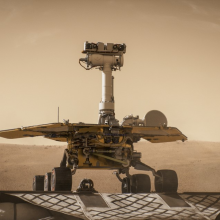
Will Mars rovers find signs of life?
Will - How to find a fossil on Mars. It's a fantastic time to be interested in the planet Mars. We have multiple surface Rover missions going on at the moment. We've got NASA's Curiosity and it's more recent Perseverance rover working their way across specifically targeted parts of the planet's surface today. And Mars has a gift for the scientist, people like myself, in that it has a very pristinely, beautifully preserved ancient geomorphic records, a surface record of its former landscapes, whereas on earth today, such landscapes, they don't last too long because we have active plate tectonics. Over geological times scales our landscapes are destroyed. We also cover up these beautiful landforms with buildings and they're covered by vegetation. It's quite hard to actually get a handle on the ancient geomorphic surfaces that comprise Earth. But Mars is different. Mars' ancient geomorphic record goes back billions of years and it tells us a history of a far warmer, wetter past.
Chris - Why have we got plates moving around and resurfacing the earth with volcanoes and earthquakes but Mars doesn't?
Will - Yeah it's a big question that lots of people are still wrestling with an answer for. We think very early in Mars' history, it probably did have some manner of plate tectonics, but pretty early on the process that's internal to the planet that actually caused continents to move around, above plates on Earth today. These processes shut down on the planet Mars and essentially left it vulnerable. It's got very low erosion rates, throughout earth history. So it basically left these final snapshots of these processes amenable to observation for billions of years.
Chris - In other words, for a fossil hunter, it's heaven if earth was like that, you'd find this amazing record of everything going back over all time.
Will - Absolutely, And this is why the rover's missions are critical to our success. Because if we could actually get geologists to the planet Mars, and actually go and touch and sniff and lick rocks, I think we'd be there by now. Right now we have to make very strategic decisions on where to go and look for our fossils on the planet. So Mars' geomorphic record, we know we've got ancient rivers, we've got lake systems, even Deltas where rivers might have met the sea. These are very habitable environments, so it's very plausible that 3 billion years ago Mars was inhabited. But that's one thing.
Chris - Have we seen anything interesting yet or anything that's got scientists excited?
Will - We found environments in which life could plausibly exist, or could have existed. We're talking 3 billion years ago, so even by a geologist's standard, this is a long time ago.
Chris - But what happened to that fossil that looked like it had some funny bacterium in it that made history? NASA said, look, have we found life on Mars? They said, are these fossilised microbes or something. Did that amount to nothing in the end?
Will - It did amount to nothing and this is going to be the curse of the planetary geologist if you like. It's very hard. We are not expecting to find, sorry for the sci-fi fans, aliens with faces. The period of history we're talking, 3 billion years ago, it's 1 to 2 billion years older than when multicellular life existed on earth. We are looking for microbial life, but when it comes to microbial life, it's very, very simplistic. So it can leave certain signatures of its potential former presence, a variety of textures which basically developed as a result of the microbial surface's interactions between the substrates and the atmosphere. But there's a lot of overlap between simple processes that form abiotically, but makes similar looking textures.
Chris - We're looking for those and are we looking for the chemical fingerprint as well then that life, even though it might not be there now, was there?
Chris - Absolutely. And this is again why possibly when we actually do get somewhere, we're not going to be finding this alien with a face. We are looking for muds. Muds are fantastic at preserving signs of life, but there's certain clay types that can actually only form through soil forming processes linked to biology. So it's those clays we're after.
Chris - And what about not Mars, but much farther away, Zander, you were saying that we can now see what's in the atmosphere of distant planets. Does this mean potentially we could go after Mars type environments or are the telescopes not up to that yet?
Xander - Well, they are getting better and better and, as I mentioned, with the advent of the James Webb Space Telescope, we are finally being able to detect molecules in the atmospheres of these distant planets, which we would never have been able to do before. In recent months, James Webb has found the first signatures of carbon dioxide, sulfur dioxide, quite considerably strong components of many of these atmospheres.
Chris - Do we know what we are looking for, though? If we were to see a distant world, would we know what the signature in the atmosphere to look for that would tell us, hey, there's probably life there?
Xander - Well, there are certain chemicals that people, we call these biosignatures, which could potentially be evidence of life there. Some of these are quite controversial. For example, I think the main one that we are really looking for is oxygen, because it's quite difficult to have oxygen in an atmosphere for a very long time without there being loads and loads of trees and algae constantly pumping it into the atmosphere as we have here on earth. But as I say, this is quite controversial because there are some people who think that there are certain processes that exist, which could generate oxygen under abiotic processes without life. So I think even when we find some kind of signature that there might be life somewhere, it will be argued over quite a lot.
Chris - The other thing that people often bring up is water. And they say this is a critical ingredient for life. Why?
Xander - I'm not a biologist, but I think it's just because water is such a crucial solvent and so it just is completely crucial for any form of life. It's a bit of a case of it's necessary, but not really sufficient, because you need water in order to have life, but just because you find some water there doesn't mean there is necessarily life there. In the first press releases of the James Web space telescope, it found water on an atmosphere of a sort of Jupiter size exoplanet. But this was an incredibly harsh environment, ridiculously high temperatures, thousands of degrees. So there would certainly be no life there, even though there is water
Chris - Some sauna, isn't it?

How do we show more self control?
Charlotte - Self-control is something that gets talked about so much of, sometimes almost seen as this holy grail of psychological capacities and the scientific sort of view of self-control is essentially the capacity to resist a tempting thing - like flopping on the couch after a long day at work in order to pursue a goal. So, for example, to get fitter or to run a 5k. And there are differences between people and how good they are at this, but that may be due to strategies that people use so, for example if the couch is really tempting and you want to get good at running, you might go to the gym straight from work instead of going home.
Chris - So you subvert yourself into doing virtuous things?
Charlotte - You can trick yourself a little.
Chris - So you basically know what your weaknesses are and you know you can avoid everything except temptation. And so you sort of make sure you plan your life because someone always said to me when I studied nutrition, they said never go shopping when you're hungry, for example. You always buy all the wrong stuff.
Charlotte - I think that's definitely one strategy that people can use. But I'd say that it's also really important to stress that self-control is only one piece of the puzzle, right? And so there are environments that people make decisions in and often those can be outside of people's control. So you have to have access to resources, to time, to money to buy a sustainable and healthy diet, for example, or to use public transportation, it has to be accessible, right? So I'd say strategies for goals are great, that's something that we can all work on to some extent, but mindset isn't everything and we can't remove structural barriers through positive thinking.
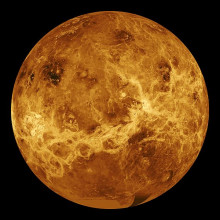
Life on Venus?
Will - It's a new game.There's certainly a lot of debate about it. It's got people talking, but that's a good thing. That's the scientific method showing it's working. I think when we consider life on other planets, it's very easy for us to think that life is going to be very familiar to us based on our understanding of life forms on Earth. That's not necessarily the case. There's however many billions of stars and planets out there, which I'm sure Xander knows better than me. There might be forms of life that we couldn't possibly comprehend. Certainly if there was a different form of life that we are used to on our neighboring planet, that would probably tell us it's everywhere. But that particular find, I think it's still being debated somewhat.
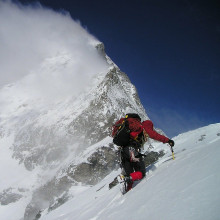
16:42 - Why are planets round and mountains pointy?
Why are planets round and mountains pointy?
Will - Okay, well there's different scales, right? Planets form through planetesimals, over vast periods of time.
Chris - What's one of those?
Will - So a baby planet. So if we were in our solar system and we have asteroids colliding and accreting and forming progressively larger and larger bodies, they essentially start having their own sort of gravitational field, which kicks in a feedback loop and attracts more space to breed to them. So they get bigger and bigger and bigger until ultimately you've cleared up all the muck in your general area and you've got your planet.
Chris - So that explains why you get a ball because under gravity, everything's pulling towards the center of the ball and it's the ball shape is the closest everything can reasonably get precisely without being too far from anything else. So that's why they're round from a distance, but close up mountains pointy. So what makes mountains go pointy?
Will - And plate tectonics will have a big part of that. So it's not just a perfect beautiful sphere, but it's a fractured sphere and our plates are constantly moving along it over very small periods of time. We famously talk about the Atlantic sort of rifting and North America getting further away from us today at about the rate our fingernails are growing, but geological time is long. We're talking hundreds of millions of years, billions of years. So these plates do collide in force uplift, and with that uplift comes essentially, you take your ball and you get large amounts of it and project it upwards. And when you are topographically higher, then you're more vulnerable to erosion. But that erosion doesn't necessarily hit all the same spots equally.
Chris - So in summary then gravity makes planets and it makes them round because it pulls all the material together a bit, like a raindrop, which is all the water trying to get as close together as possible. That gives you the round shape from a distance. But when you zoom in a bit closer, you find that local factors have pushed things up to make pointier surfaces. And that's why mountains are pushed up and they're pointy. But eventually they'll wear down and go flat if nothing's making more mountains.
Will - Absolutely. And these are continuous processes that will happen time and time again.

Is Twitter now a more dangerous place?
Stefanie - It doesn't really surprise me very much to be honest, to see these kinds of results, because it mostly shows to me, or it proves the point, that unfortunately a lot of detection work on harmful content, disinformation, hate speech is still done by humans. So of course, if you let them go, the algorithm can only do the work to a certain extent.
Chris - I get you. So by reducing the size of the workforce who were scrutinising what was going through the platform, there are fewer filters in the way?
Stefanie - Exactly. A lot of the things that are taken out, fortunately we will never see a lot of content like terrorist content, child pornographic content. There are literally human beings who are looking at this for hours every day and filtering it. Because a lot of algorithms are still struggling with doing the detection work and humans are still much better at this.
Chris - The problem is though that computers are not very good at doing it, isn't it? Because people are saying, we need to substitute computers, get them to scrutinise it, and then we fall victim to being declared doing something nefarious when we are not. There was a wildlife organisation, a charity, that put out some tweets about woodcocks - that's a bird. And they were very interested in raising awareness and unfortunately they fell victim to Twitter. And it was ironic that it was a bird charity that fell victim to Twitter's filter. I guess that's why people like you are trying to solve this, isn't it, to try and make more intelligent filters?
Stefanie - I'm not entirely sure whether artificial intelligence will ever fully be a solution for this. It just shows how nuanced and how contextual language is. So, of course, a human being would recognise this as a charity by the background knowledge that we have, contextual knowledge. But of course an algorithm does not have that.
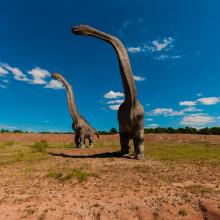
Where would I hide a Jurassic time capsule?
Will - Well, I mean, I certainly wouldn't choose the Jurassic if I had a choice, I don't think I'd last very long.
Chris - But I think that's the point he's making is he wants pictures of dinosaurs?
Will - Well, I'd home in on the Goldilocks zone. I'd certainly choose continental crust. We have two types of crust, continental crust, and oceanic. Oceanic is less buoyant, it's denser. So when the two meet, it's the oceanic crust that subducts. So whilst my camera might be waterproof, it probably can't survive subducting to earth's mantle. It's probably a bit too hot for it. So I'd choose land. Maybe I'd choose a mountain. Well, mountains erode as we said earlier. I wouldn't know where my camera would end up. So I'd probably be heading towards Earth's more lowland environments. I'll introduce a term here: sedimentary basin. These are essentially depressions in earth's landscape where sedimentary rocks, sedimentary piles, can build up, they can accrue. So I'd find somewhere that was actively depositing such that my camera has a chance of making it into the record. I'd need it not to be connected to the oceans. If I put it in a river basin, long after I've been eaten by the T-Rex, the river shifts, reworks where my camera was and takes it off to the ocean and abducts it to the mantle, that's not doing us any good. I'd probably try and find, a lake, ideally a hydrologically closed lake, a lake that's not connected to the ocean in any way, but sort of disconnected by some sort of resistant topographic upland, something with high preservation potential, this sort of very low energy environment with no chance of my camera sort of heading out anywhere. This is the case where my sediment could sort of gradually over time build up around it and preserve it. But we've still got a problem then: we might preserve the camera, but we still need to expose it in the present day for a modern geologist who is wandering around. Where geological outcrops exist, it's very stochastic. It's very random. We need a road cut in a nice area or a beach where waves are bashed and exposed our rock.
Chris - When you said exposure I was thinking of camera exposure, It can be digital, you're all right. But I guess what you mean is it's got to come to the surface in some way so that someone like you can stumble on it?
Will - Absolutely. And the chances of that happening are pretty minute. I think if all these dreams did come true and I was the geologist that found the camera, I'd be more interested in how the time machine was invented.
Chris - The physicist in you would kick in. Surely a really good answer to this question is you would go and find where all the fossils are and go back to where there's a really rich source of fossils and put it where those fossils are going to have come from, because there's lots of likelihood someone will go and dig in that area, and that's an area that's going to be preserved from that time period.
Will - That's true. I guess I'd have to also then trust the paleo continental reconstructions and try and retrace my geological footsteps.
Chris - But you guys know what you're doing, don't you?
Will - I trust my peers. I don't do the pale continental reconstructions myself.

25:04 - Can balloons be used to explore space?
Can balloons be used to explore space?
Xander - Well, in some ways, yes. I mean, NASA already uses balloons for quite a considerable amount of research. The main advantage is that they are just so much cheaper than using a rocket to try and send something all the way up into space. For a balloon, you can't get it all the way, of course, because you need this kind of buoyancy. You need that to still have some atmosphere there. You can't get it all the way up into space, but you can get it very, very close. And for something like 1% of the cost. So it's pretty good on that front.
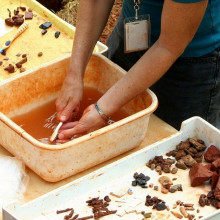
33:38 - Are cultures that burn their dead less studied?
Are cultures that burn their dead less studied?
Chris - Interesting point though, isn't it? Because if you burn stuff up and destroy it, there's no archeological or paleontological record of that.
Will - It's a wonderful question and there's a wonderful term for the study of the fossilization process, which is essentially what we're talking about is known as taphonomy, which derives from the Greek word for burial. The Greeks got in on this game. Early Aristotle famously thought fossilized fish were just fish that swam into cracks into rocks and sort of got trapped and died and interred. And these ideas stuck around for a couple of thousand of years. In short, of course, yeah, if you have a culture that buries your dead, you're doing yourself a favor in leaving a record of your existence. Though I'm sure these early humans had more important things to think of. But this isn't the only factor that comes into it. We have one body which we could potentially give the fossil record, but over the course of our lifetime, we might leave a billion footsteps. We can leave traces of our existence with every activity that we do every single day. We build houses, we forge weapons, we forge tools. You know, the trace fossil record is far more powerful in a way than the body fossil record. And even if we were burying our dead, there are certain environments that are very amenable to preserving a body fossil, but certain environments that aren't. If we bury things in sandy substrates, bodies degrade, but in these same environments, they might actually lend themselves to preserving trace fossils, to preserving footsteps. So I can't see it being too much of an issue because whilst the body fossil record might be depleted for one set of humans or another trace fossil record of their existence, that's gonna be pretty compelling.
Chris - The assumption in Paul's question is that people have a planned death and a planned burial or end of life, but lots of people's lives end in an accident. And there are some wonderful specimens preserved where people have just fallen down a hole into a cave or into mud or, or got into sinking mud or something, and then they're preserved 3 million years later within that environment. So I suppose in that regard you are saying the science is robust because they wouldn't have been burned up whether they were going to be or not.
Will - Precisely. I mean, we have another wonderful word for exceptional preservation. We call it lagerstätte and it derives from German for motherlode. There are fantastic case studies. We've got bog bodies in Copenhagen, in Denmark, and fantastic specimens over the Atlantic as well. But these really are the exceptions. Trace fossils, they're pretty mundane. They're everywhere. They leave a more compelling history.
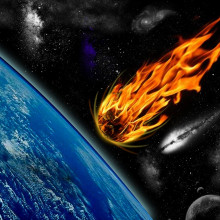
How did sharks survive while dinosaurs didn't?
Will - With mass extinctions, it's rarely one thing that is the final act for a particular organism or group of organisms. Let's take the dinosaurs after the impact event. It would've killed off a lot of earth's grasslands. We're talking about the continents right now. There'd have been a lot less vegetation, which is bad news if you're a herbivore, there's less food for you to actually eat. There's more competition for the food that remains, so the herbivores were diminishing in number as a result. That means there's less food for the carnivores and the omnivores. Suddenly it's a very good time to be a bird, with their evolution of those wings, they could cover huge areas and actually find what food remained.
Chris - And birds are warm blooded, of course, which presumably helped?
Will - Yeah, it probably makes them more energy efficient as well. Probably makes them less dependent on actually getting the calories. A reason crocodiles did so well out of the mass extinction event (crocodiles have existed on the planet long before even the dinosaurs, is that they could essentially shut down. They could not require food for months on end. They could essentially afford to go longer without finding their next meal. But if we go to the oceans, sharks, maybe they were just fish generalists. They weren't fussy eaters. It pays not to be a fussy eater during a mass extinction. So they might be able to hoover up what fish remained after the extinction event. Whereas some of their big aquatic reptilian cousins, even despite their size, maybe they were just being out-competed for the same prey.
Chris - Well, I'm glad because I was going to ask you that precise question because there were reptiles living in the ocean alongside the sharks that you'd think, well, why don't they survive if the sharks can? And you think it's because they were a bit too fussy in their eating habits?
Will - The chances are they're going for the same food. We don't actually know which were the apex predators between some of your large Mosasaurs and Ichthyosaurs versus things like sharks. Sharks didn't have size necessarily on their side. They grew into much larger things well after the extinction event that did away the dinosaurs. But at this time, maybe they were just very well coordinated. Maybe they were faster and more agile and were able to actually evade their predators and catch their prey more efficiently and maybe that's what got them through.

Why does stress impact on sleep?
Charlotte - Stress is a really natural response that our bodies have to a perceived threat, but it can become a problem when it disrupts your wellbeing. It can really affect your mental and physical health and that includes sleep as well, because it really affects all systems in the body, like hormones, neurotransmitters, your muscle tension, your breathing. And this is actually a really common problem. One in four adults, for example, in the US, say that they're so stressed on most days that they can't function. Something that can be helpful for people is to identify sources of stress. Is it something psychological or something physical? Is it acute or is it chronic? Like a long-term situation in your life that's really stressful? Or is it something perhaps in the environment, like pollution, poverty. Or internal, because often I find that a common recommendation is for people to make changes to their lifestyles but there is also the stress that we can't just meditate or exercise away that need more systemic solutions.
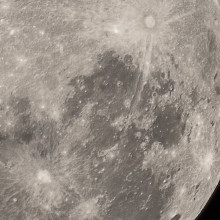
40:50 - Could you take a shower in a moon base?
Could you take a shower in a moon base?
Xander - This is really interesting, I don't think anyone's really looked into this very much. So what I think would happen, right, is so when you are having a shower, the water that's on your body, there are two forces on it. There's obviously the gravity pulling it down off your body to the floor. And there's also a quite small, but definitely there, an electrostatic attraction from the water to your skin. And so this is why, when you come out of the shower, they'll still be like little droplets of water on your skin. They won't just fall straight to the ground. Now that force will pretty much be the same on the moon as it would be on the earth, but the moon of course has less gravity than the Earth. I think it's about a factor of six or something that the gravity would be weaker. So the droplets would need to get larger before the gravity would be strong enough to pull them down off your skin. So I think in terms of what it would actually be like, it would sort of feel stickier in a way. It might be a little uncomfortable. It would feel really quite strange.
Chris - Do you think you'd have a more efficient shower because you'd get effectively wetter because the water would stick to you for longer and then take longer to fall off you?
Xander - Yeah, I mean that's true, but what you really want in a shower, what I really want in a shower, is for the water to wash everything off. So perhaps if there's less gravity, then the water wouldn't be washing you as much and so it would be a less efficient shower.
Charlotte - Otherwise you're just taking a bath now <laugh>.
Xander - Exactly, yeah.
Chris - Just standing up, which should be quite an interesting experience
Xander - Yeah, I mean if you are kind of floating in zero gravity, all the water will just stick to you and you'll be surrounded in some kind of weird watery film.
Chris -
Imagine a swimming pool in space because a swimming pool on a space station that didn't have somewhere to make, in inverted commas, 'making gravity.' You'd have a swimming pool that was like a bubble.
Xander - Yeah. There would just be a ball.
Chris - And you'd get trapped inside it so you wouldn't actually be able to get out very easily. How would you 'surface' ? There's no up and down.
Xander - I mean, you would still be able to swim towards the surface of it so you'd be able to push the water around you back in a way. I mean this is obviously how swimming works wherever you are. So yeah, you would be able to kind of push the water away.
Chris - Do you think you would, as you came across your notional floating bubble, do you think you'd just keep swimming and just swim out of it?
Xander - Probably, yeah,
Chris - And then sort of drag a trail of water with you across it.
Xander - Yeah, I think that's probably what would happen. Yeah. And as I say, there would be probably more water that would stick to you than you would probably like
Chris - Which ushers in a whole realm of possibilities for new hair care products and all that kind of thing. And body shower gels and all things.
Xander - Yeah. Maybe they have to have a different concentration of all the different minerals on, on the moon or whatever.
Chris - Fascinating concept and a great question.

Can we distinguish ChatGPT from human speech?
Stefanie - I don't really see any major threats right now. Chatbots, for example, have been able for a long time to create harmful language that is concerning, that is threatening. But right now I wouldn't say that ChatGPT is really a threat. There are a lot of of people already working on developing systems that can automatically detect whether a text was generated by an AI or human. These do not work perfectly well yet, but considering how fast research is moving forward in this field I would assume that this will be possible in the near future. I've tried out ChatGPT, just out of curiosity, and I would say it does produce some pretty good text in terms of structure. It's got good syntax, good grammar, good vocabulary, but in terms of what a human being can produce and the idiosyncrasies that just having human experiences adds to how we would write a text, I think there are still huge differences and it's pretty easy to spot.
Chris - It fell down in tests on facts though, didn't it? It talked a good game but yeah when you go below the surface, it's extremely iffy indeed, isn't it? You're nodding Will?
Will - Well, as a vanity project, the other day I was asking ChatGPT some questions which I knew the answers to from my own research, to see if it would get it. And what concerned me was it was, is it able to tell good research from bad research? Does it have that hurdle of peer review? Once something's published, does it think it's fact?
Stefanie - I wouldn't trust it. For example, it does make up its own references, so I certainly wouldn't trust it to write my essay for university, for example.
Chris - Although some people did do that and submitted them as a test to their tutors and they got quite good marks.
Stefanie - It might force us to maybe reconsider how we read and how we mark essays. I wouldn't necessarily say that's a terrible thing. And also we might just want to adapt and rethink and consider how we can use this tool to our advantage. It can give you a pretty good first draft maybe of something, but then you can use your own tools and skills as a student, as a scholar, to make it really good. And then get a top grade and not just an average.
Chris - Let's hope so.
Related Content
- Previous What would T-Rex taste like?
- Next A NEW Co-Host!










Comments
Add a comment